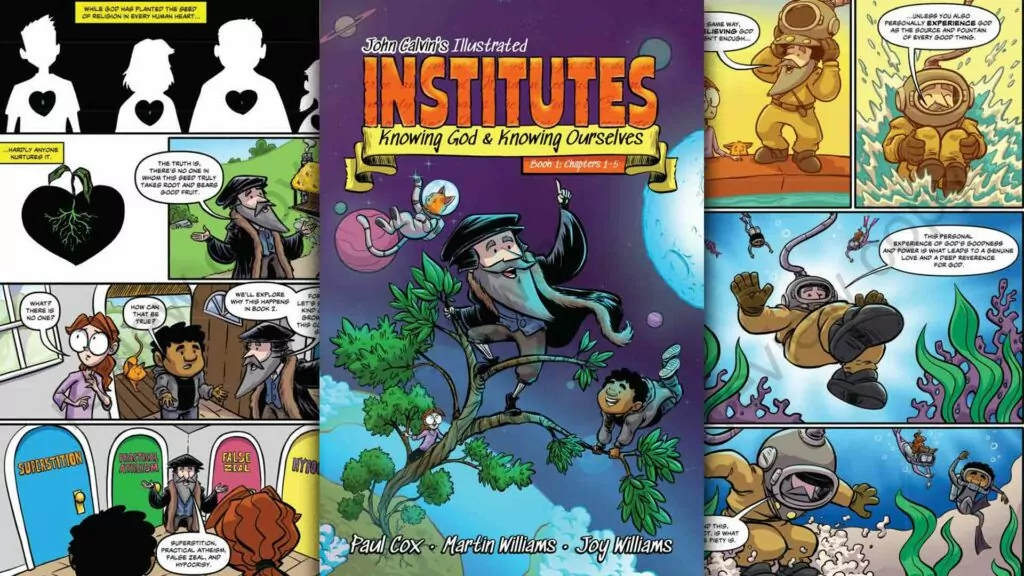“Wait…what?”
As our family has been reading through the Bible, certain passages (starting right off with Genesis 4) make it necessary to at least touch on the “birds and the bees” with kids. But I wasn’t ready to hear my six-year-old say:
“Dad how do you spell ‘sex’?”
“Wait…what!? What do you mean?”
“Well, I’ve already got I and N and I need to know what comes next.”
“Oh, okay. It goes S – E – C – T – S.”
Gender confusion clarified
“The two most ridiculous errors about men and women are unisexism and male chauvinism. The unisex feminist says that women and men are not different in value, therefore they are not different in nature. The male chauvinist says that men and women are different in nature, therefore they are different in value.”
– Peter Kreeft
Big and burly, but…
“If you, Professor Glover, were stranded at the midnight hour in a desolate Los Angeles street…and you saw 10 burly young men who just stepped out of a dwelling coming toward you, would it or would it not make a difference to you to know they were coming from a Bible study?”
– Dennis Prager making it clear to atheistic philosopher Jonathan Glover that the Bible does indeed have a positive effect on society
Are you influencing, or being influenced?
“If the Church is not transforming the culture around her, then the culture around her is transforming the Church. There is no static equilibrium point.”
– Douglas Wilson
On the need to read what’s old
“Every age has its own outlook. It is specially good at seeing certain truths and specially liable to make certain mistakes. We all, therefore, need the books that will correct the characteristic mistakes of our own period. And that means that old books.”
– C. S. Lewis
Was Noah’s Ark a local flood?
Some Christians – those trying to reconcile evolution with creation – will say that Noah’s Flood was just a local affair, maybe widespread, but certainly not something that covered the whole Earth.
There are a few problems with that idea, but one that isn’t often mentioned is God’s promise in Genesis 9, to “never again” send “a flood to destroy the earth.” The type of flood God is talking about here is the sort to “destroy all flesh.” That doesn’t sound local.
But if it is merely local, then we have a different problem. Local floods have happened a plenty since this promise was made, so, if we interpret the Flood, to just be one a local flood, then when God promised not to send another, we have the problem that God doesn’t seem to be keeping His Word. And we know that can’t be.
So here’s the end of the matter: we can either go with the eyewitness testimony of the Bible and accept it all, or we ignore what the Bible says and adopt Man’s theories instead. But the one choice that just isn’t open to us is to reconcile the two to each other. Here’s one example of how it just can’t be done.
Don’t put God off, and don’t ever assume it is too late
“The Bible, which ranges over a period of 4,000 years, records but one instance of a death-bed conversion – one that none may despair, and but one that none may presume.”
– Rev. Thomas Guthrie (1803-1873), in Early Piety
If you don’t know, you can’t kill
In Michael Wagner’s new book True Right: Genuine Conservative Leaders of Western Canada, he details an encounter between pro-life journalist Ted Byfield and abortionist Henry Morgentaler, and the question that stumped Morgentaler.
From early on Ted Byfield was a spokesman for the pro-life cause. He has been an outspoken defender of unborn children. In one instance he was asked by the CBC to be on a television program with the infamous abortionist Dr. Henry Morgentaler. In the course of this program Byfield presented Morgentaler with a particular hypothetical situation of the kind social studies teachers were being encouraged to present to their students:
Several men are out in the woods hunting. Suddenly one of them sees something move in the bush. At last, he rejoices, a deer. Then a warning flashes through his mind. That might not be a deer. That might be one of the other hunters. Question for the class: Should the hunter fire at the thing if there’s a chance it’s another human being? The approved answer is no.
After posing his question the television program was never run and he was never invited back. Morgentaler was a CBC hero and Byfield’s question exposed the wicked cause that he was promoting. The question may have been considered unfair. [Byfield later wrote]:
The question may be hypothetical but it is certainly not unfair. The doctor, along with other liberals who defend this hideous practice, in effect argues as follows: We do not know at what point during pregnancy a fetus or an embryo becomes, in fact, a human being—whether at the instant of conception, or at the instant of birth, or at some intervening stage. Because of this uncertainty, abortion may be permitted at some elementary phase of growth. In other words, since we do not know whether the thing is human or it isn’t, then it is all right to kill it, the very reverse of the conclusion that sane people would reach in the case of the hunter. The moral principle must surely be: If you don’t know, you don’t kill it.
You can purchase True Right at Merchantship.generationalfamilies.net.
Reagan’s high school principal was a good sort
President Ronald Reagan once told a story about why he had such “a warm spot for principals.”
“I was in the principal’s office once…and I wasn’t there just to pass the time of day. Well, at one point he said to me, ‘You know, I don’t care what you think of me now, I’m only interested in what you think of me fifteen years from now.'”











